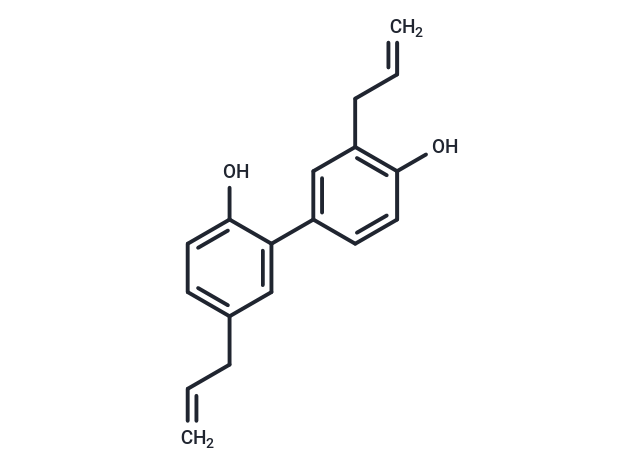Shopping Cart
- Remove All
 Your shopping cart is currently empty
Your shopping cart is currently empty

Honokiol (NSC-293100) is the active principle of magnolia extract. It inhibits the activation of Akt and enhances the phosphorylation of ERK1/ERK2.

| Pack Size | Price | Availability | Quantity |
|---|---|---|---|
| 50 mg | $50 | In Stock | |
| 100 mg | $63 | In Stock | |
| 1 mL x 10 mM (in DMSO) | $50 | In Stock |
| Description | Honokiol (NSC-293100) is the active principle of magnolia extract. It inhibits the activation of Akt and enhances the phosphorylation of ERK1/ERK2. |
| In vitro | Honokiol exhibits direct antiangiogenic activity by blocking the phosphorylation and racemization triggered by VEGF-VEGFR2 interaction. It promotes apoptosis in CLL cells through the activation of caspase 8, which then activates caspase 9 and 3. Honokiol demonstrates pro-apoptotic effects in cell lines of melanoma, sarcoma, myeloma, leukemia, bladder cancer, lung cancer, prostate cancer, oral squamous cell carcinoma, and colon cancer. It effectively induces apoptosis in SVR sarcoma cells and inhibits the survival of CLL cells mediated by interleukin-4, enhancing the cytotoxicity of bendamustine, fludarabine, and cladribine. Honokiol kills myeloma cells in relapsed patients at doses that do not harm PBMCs. Treatment with Honokiol reduces the phosphorylation of MAP, akt, and c-src in SVR cells. Moreover, Honokiol treatment induces the cleavage of caspase 3, 7, 8, 9, and PARP. It also induces apoptosis in colon cancer cells RKO, enhances apoptosis, and suppresses osteoclastogenesis and invasiveness by regulating the NF-κB activation pathway. |
| In vivo | Honokiol inhibits the growth of RKO cell tumors in transplanted mice and effectively counters SVR sarcoma in nude mice. Furthermore, when treating transplanted tumors in mice, Honokiol suppresses the growth of MDA-MD-231 breast cancer cells. |
| Cell Research | Honokiol is dissolved in DMSO. In cytotoxicity assays, 10,000 cells/well are added to 96 wells plates and incubated overnight, thereafter cells are treated with different concentrations of Honokiol dissolved in dimethylsulphoxide (DMSO). Since Honokiol is not soluble in aqueous solvents, for in vitro studies Honokiol is dissolved in DMSO. To study the possible effect of DMSO on cells, solvent (DMSO) control is used at highest concentration of <0.1%. After 72 h treatment, cells are fixed and cell viability is measured by crystal violet staining (0.05%). |
| Alias | NSC 293100 |
| Molecular Weight | 266.33 |
| Formula | C18H18O2 |
| Cas No. | 35354-74-6 |
| Smiles | OC=1C(=CC(CC=C)=CC1)C2=CC(CC=C)=C(O)C=C2 |
| Relative Density. | 1.107 g/cm3 |
| Storage | Powder: -20°C for 3 years | In solvent: -80°C for 1 year | Shipping with blue ice. | ||||||||||||||||||||||||||||||||||||||||
| Solubility Information | Ethanol: 26.6 mg/mL (99.88 mM), Sonication is recommended. DMSO: 55 mg/mL (206.51 mM), Sonication is recommended. | ||||||||||||||||||||||||||||||||||||||||
Solution Preparation Table | |||||||||||||||||||||||||||||||||||||||||
Ethanol/DMSO
DMSO
| |||||||||||||||||||||||||||||||||||||||||

Copyright © 2015-2025 TargetMol Chemicals Inc. All Rights Reserved.